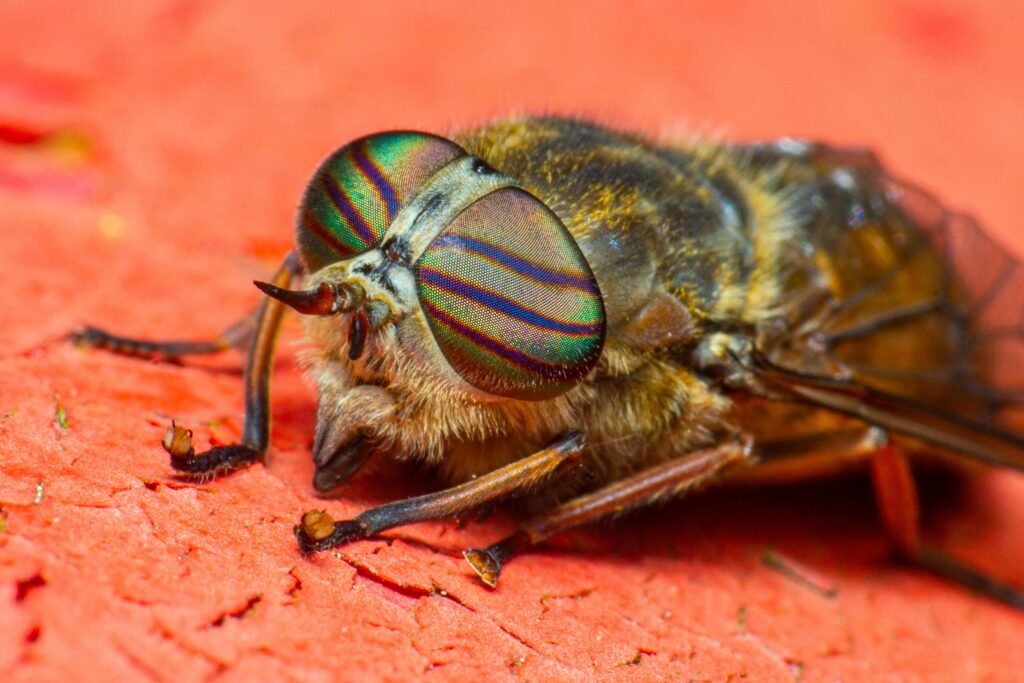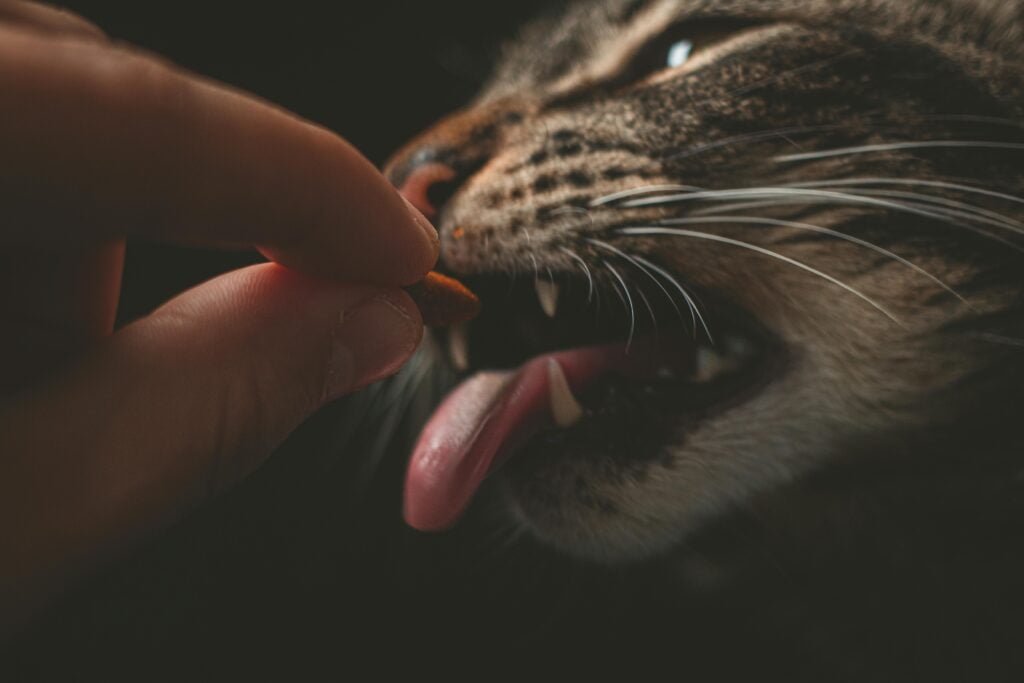
Have you noticed that your cat is grooming itself aggressively or scratching furiously? It might be under severe discomfort caused by invisible cat parasites!
Cat parasites are tiny troublemakers that cause much distress to your beloved kitty. They can be on your cat’s coat or inside your cat’s intestines. They will bite and suck on your cat’s blood and nutrients. They will rob your cat of its shiny coat and cause bald patches and lesions. If your cat is infested with cat parasites, it will lose weight, become weak, and seriously sick. These parasites can also be transferred from your cat to you and your kids.
Sounds scary, right?
But all is not lost. There are options to treat cat parasites effectively and completely. You can even take preventive measures so that your family and pets are safe. Read on to find out how to raise a parasite-free cat.
Most Common Cat Parasites

Common External Cat Parasites
External cat parasites make a home on your cat’s skin and fur.
Fleas
Fleas are tiny wingless insects that can leap from pet to pet or pet to humans. They are dark brown in color and tiny in size – no larger than a pinhead. Cat’s fur especially around the neck and base of the tail, provides them with the perfect cover to hide. So, if you notice your cat scratching and itching these areas, it is most likely a flea infestation. You can check for black specks on your cat’s fur and its bedding. These black dots are flea droppings – which confirms the presence of fleas even if you can’t see them.
Ticks
Ticks hitch a free ride by attaching to your cat’s skin. They can be very tiny when they attach. Then, they feed on your cat’s blood and grow bigger and bigger. If you have an outdoor cat, they are at a higher risk of these ticks. Ticks are more likely to latch onto the ears, neck, and between the toes of the cat. Check these areas regularly to make sure that your kitty is tick-free. You can also run your hand over the cat’s body and fur. If you feel any bumps, inspect to make sure there are no ticks latching on and sucking your cat’s blood.
Ear Mites
Ear mites are so tiny that you can not see them with your bare eyes. But these tiny cat parasites can become a big problem for your furry friend. If your cat has ear mites, you will notice them scratching themselves behind the ears and shaking their head. Ear mites also cause dark, crumbly discharge from the cat’s ears. This discharge can look like coffee grounds. Some mites cause intense itching sensation, scabs on the skin, and hair loss.

Common Internal Cat Parasites
Now, let us have a look at the internal cat parasites, i.e., parasites that live inside your cat and cause trouble.
Roundworms
Roundworms are thin, spaghetti-like worms that infest your cat’s intestines. These pale worms are three to five inches long and have a cylindrical body. Female roundworms can lay up to 300,000 eggs per day, and these eggs are passed through cat feces. These eggs can survive outside for many years.
Your cat can get roundworms if it ingests infected feces or soil. Your cat can get these cat parasites if it eats a rodent with roundworms or through mother’s milk. You can often spot these ringworms in your cat’s vomit or poop.
Tapeworms
Tapeworms are flat and ribbon like cat parasites that grow up to 8 inches in length. They attach themselves to the intestine lining of the cat. Tapeworm bodies are made up of many segments, with each segment containing up to 20 eggs. These body segments often break off and are passed through cat feces. If you notice rice-like pieces around your cat’s bottom or on its bedding, these are the broken segments passed through the cat’s poop. Tapeworms are spread through fleas, So, if your cat has a flea infestation, then it will most likely have tapeworms too.
Hookworms
Hookworms are tiny compared to other cat parasites like ringworms, but they can cause major damage to your cat. Hookworms attach to your cat’s intestine walls and feed on your furry pet’s blood. If you see that your cat has pale gums or has diarrhea and pooping blood, it is most likely because of hookworms. Your cat becomes exposed to hookworms through its mother’s milk, eating an infested rodent, or through contact with contaminated soil. Outdoor cats are at a higher risk of hookworms.
How Cat Parasites Affect Your Cat’s Health

Cat parasites should be taken seriously. They not only cause discomfort but can make your beloved pet seriously ill. Here is how internal and external cat parasites affect your cat’s health and well-being –
Itching
Cat parasites, especially external ones like fleas and mites, are famous for causing itching and severe discomfort. When a flea bites your cat, there is an allergic reaction to the flea’s saliva, which causes itching. The discomfort of the itching makes your cat scratch, bite, and lick its skin aggressively for relief. Ticks will attach to your cat and suck on your cat’s blood. They cause irritation, redness, swelling, and inflammation of the skin in the spots they bite. Mites can cause hair loss, scabs, itching, and crumbly discharges.
Sickness
Cat parasites can make your kitty seriously sick. Parasites affect your cat’s digestive functions, which makes them lose appetite. Internal parasites will cause nausea, which will make the cat refuse to eat. Many internal parasites cause frequent diarrhea, vomiting, adn blood discharge in the stool. These conditions make your cat dehydrated and result in further complications. Cat parasites such as worms can cause fluid accumulation in the stomach and result in a pot-bellied appearance.
Energy Drain
Cat parasites are energy thieves. They feed on your cat’s blood and the nutrients in the cat’s intestines. Cat parasites will make your cat anemic, sluggish and tired. Nutrient deficiency reduces your cat’s energy levels and makes them weak. Your cats can no longer be active and playful as the parasites are feeding on their body.
Coat
Your cat’s shiny and smooth coat is a major indicator of your kitty’s overall health. Cat parasites such as fleas and mites will make the coat dull and dry. The cycle of itching and scratching will make the coat look less vibrant. Severe scratching and biting can result in bald patches and skin lesions for your cat. Your cat will also lose hair, affecting the appearance and quality of the fur.
How to Treat Cat Parasites
Here is a detailed guide on treating internal and external parasite infestation in your cat –
Battling External Cat Parasites

Fleas
Fleas are treated with spot-on treatments, usually applied once a month directly onto the cat’s skin. They are applied between the cat’s shoulder blades and spread through the skin oils to kill the fleas on contact. If your cat does not do well with topical treatments, you can try oral medications, i.e., pills that your cat can swallow. Some special sprays and shampoos can provide immediate relief in case of a flea infestation. The latest option is the flea collars that release chemicals to repel or kill the flies and ticks. A flea collar can last you for as long as six months.
Ticks
For ticks also, you can use spot on treatments just like fleas. Alternatively, you can use a fine-tipped tweezer to remove the tick. Grasp the tick close to the skin and pull it away straight out with steady pressure. Avoid twisting to break the tick free. Afterward, treat the tick bites with an antiseptic. If your cat is getting frequent tick infestation, you should use tick prevention measures and get regular check-ups from the vet.
Mites
If your cat has an ear mite infestation, your vet will treat it with prescription ear drops. Your cat’s ears might also need to be cleaned by a professional to remove wax and debris. This cleaning will improve the effectiveness of ear drops in treating mites. Mange mites are treated with a combination of medicated shampoo, topical treatments, and pills. These treatments have to be repeated until your cat is completely free of mites.
Taking on Internal Cat Parasites

Worms
Deworming pills are usually effective against most common types of worms, such as roundworms and hookworms. If you are treating worms with pills, you should hide them in meat to trick the cat into swallowing. Similarly, you can use flavored liquid dewormers by mixing them into wet food. If your cat does not resist, you can administer the liquid dewormer directly also. You also have options for some topical treatments that are absorbed into the bloodstream to target the worms. If the worm infestation is too severe or your cat resists medications, your vet might suggest a deworming injection.
The Importance of Vet Visits
Vet visits help your cat get an accurate diagnosis. Apart from the symptoms, your vet can use fecal tests to determine the specifics of the cat parasite. This information is valuable for prescribing the most effective treatment option. When you consult a Vet for cat parasites, you can get the right dosage based on your cat’s weight and health. The right dosage minimizes side effects.
Internal parasites such as worms can result in other health issues such as anemia or intestine complications. A vet check-up helps your cat get comprehensive treatments for better recovery. If you overuse certain cat parasite medications, your cat can develop resistance. Your vet will help you use preventive medications and treatments safely.
Follow-Up Care
Cat parasites often need a combination of treatments and multiple rounds of treatments. This comprehensive approach will ensure that all eggs and larvae are eliminated and your cat is protected. Your cat might also need a follow-up dose. Your vet might also conduct a post-treatment fecal test. This test will confirm whether the cat parasites are completely gone or if you need further treatment.
If you are a multi-cat household or have multiple pets, they should all be treated. Even if the other pets do not show any signs, they might be at risk of cat parasites. Vacuum cleaning and washing your cat’s bedding, mats, rugs etc. will eliminate any lingering cat parasite eggs and larvae.
Once the treatment course is done and your kitty is free of parasites, you can put a preventive care regimen in place.
How to Prevent Cat Parasites
As the adage says, prevention is better than cure. This saying is true for cat parasites also. Here is what you can do –
Cleanliness
Clean the furniture, rugs, and carpets in your home where your cat likes to hang out. You should clean your cat’s bedding and toys in hot water with a disinfectant. Deep cleaning will clean up the parasites and larvae from these areas of your home.
Year-Round Measures
Cat parasite prevention methods such as deworming, topical treatments, and oral medications will protect your kitty. But you have to set up a schedule for these treatments with your vet and follow it diligently.
Regular Vet Check-Ups
Routine exams will protect your cat against cat parasites. Your vet can catch parasite infestations early, even when your cat has not started showing symptoms. At this stage, management and recovery are much easier.
Feed A Healthy Diet
Internal cat parasites often get transmitted through raw or undercooked meat. If you are feeding a raw meat diet to your cat, use high-quality meat and cook it well. If you have an outdoor cat, they are at a higher risk of catching external parasites such as mites and worms when they go out and hunt.
The Human Factor: Can Cat Parasites Affect Pet Parents?
Cats are cuddly and affectionate pets. It’s very hard for the cat’s parents to stay away from them. But you must keep in mind that cat parasites can affect your health, too. The diseases caused by cat parasites are known as zoonotic diseases, i.e., they can be transmitted from animals to other humans. If you maintain proper hygiene and take preventive measures, it will lower the potential transmission of these cat parasites. This way, your family and enjoy the company of the beloved kitty without worrying about cat parasites.
Understanding Zoonotic Diseases Caused by Cat Parasites
External parasites like ticks are known for transmission of conditions such as Lyme disease to humans. Fleas often like to live on pets such as cats, but they can bite you. Flea bite will result in minor skin irritations, itching, and discomfort. Sometimes, fleas might transmit diseases like cat scratch fever (Bartonella henselae) from the cat to the cat’s parent through their bites. Ear mites in your cat can result in itching and irritation in your ears.
Internal parasites like worms can also affect you. The larvae of the ringworm can travel through your body and result in abdominal pain and vision issues. Hookworms can make you develop itchy, red lesions on your skin. Tapeworms in cats can also infect humans.
Preventive Measures Against Cat Parasites for Humans
Hand washing is the easiest and most effective hygiene practice that protects you from cat parasites. You and your children should remember to wash your hands thoroughly after handling the cat or cleaning the litter box.
If you have an outdoor garden, the soil or sand might be contaminated by the feces of your cat. The eggs and the larvae of the parasites can survive in the soil for long periods. If you do gardening or play barefoot outside, you are at risk of catching these parasites. So, it is a good idea to wear gloves and proper footwear outdoors. Also, remember to wash your hands and feet thoroughly.
A litter box has the potential to become a breeding ground for parasites. So scoop out the waste everyday and regularly clean the box with a disinfectant to kill the eggs of parasites. Remember to deep clean the floor and mats around the litter box at regular intervals. Keep your cat’s bedding also clean with washes at regular intervals.
Take your cat for regular vet check-ups. This habit will help you catch the cat parasites early and prevent transmission to humans. Keep an eye out for symptoms of cat parasites such as excessive scratching, weight loss, changes in litter etc.
When to Worry about Cat Parasites – Signs It’s Time for a Vet Visit

You can take all the precautions and prevention measures in the world. You can not insulate your cat completely and restrict their life too much. Your kitty is going to catch that occasional cat parasite. But, if you are aware of the signs, you can catch it early and treat it easily.
Home remedies are great for managing the challenges of cat parasites. But, if you can see the ticks or fleas clearly visible on your cat’s coat, you should get your vet’s advice asap. Even if the ticks are not visible, but your cat is constantly scratching and biting their skin, it is a cry for help.
Another major indicator of a cat parasite crisis would be vomiting or diarrhea. Your cat also might show a change in appetite, reduce water consumption, and lose weight rapidly. Changes in your cat’s litter box habits also indicate that you need professional help. Some cats also have symptoms such as lethargy or weakness, along with a pot-bellied appearance.
The Bottom Line on Cat Parasites
Cat parasites are definitely not the most desired part of being a cat parent. They do sound gross and unhealthy. And they are! They can seriously damage your cat’s health and well-being. So, protecting your cat against cat parasites should be your priority.
If you happen to spot signs of cat parasites, don’t panic – They are common and definitely treatable. With regular vet check-ups and preventive treatments, your cat can also avoid them.
Don’t let these tiny parasites stop you from enjoying the cuddles and playtime with your beloved kitty!




